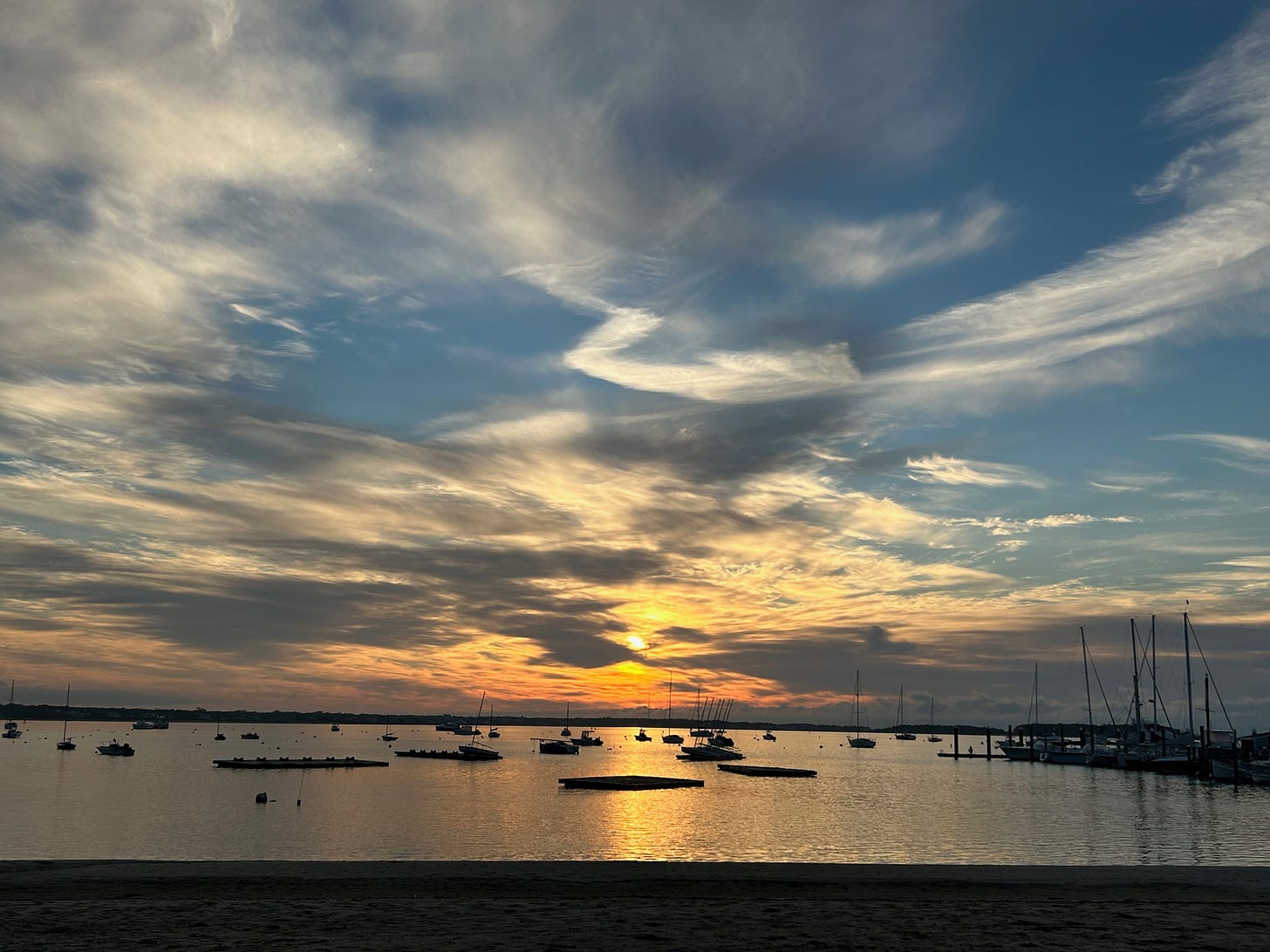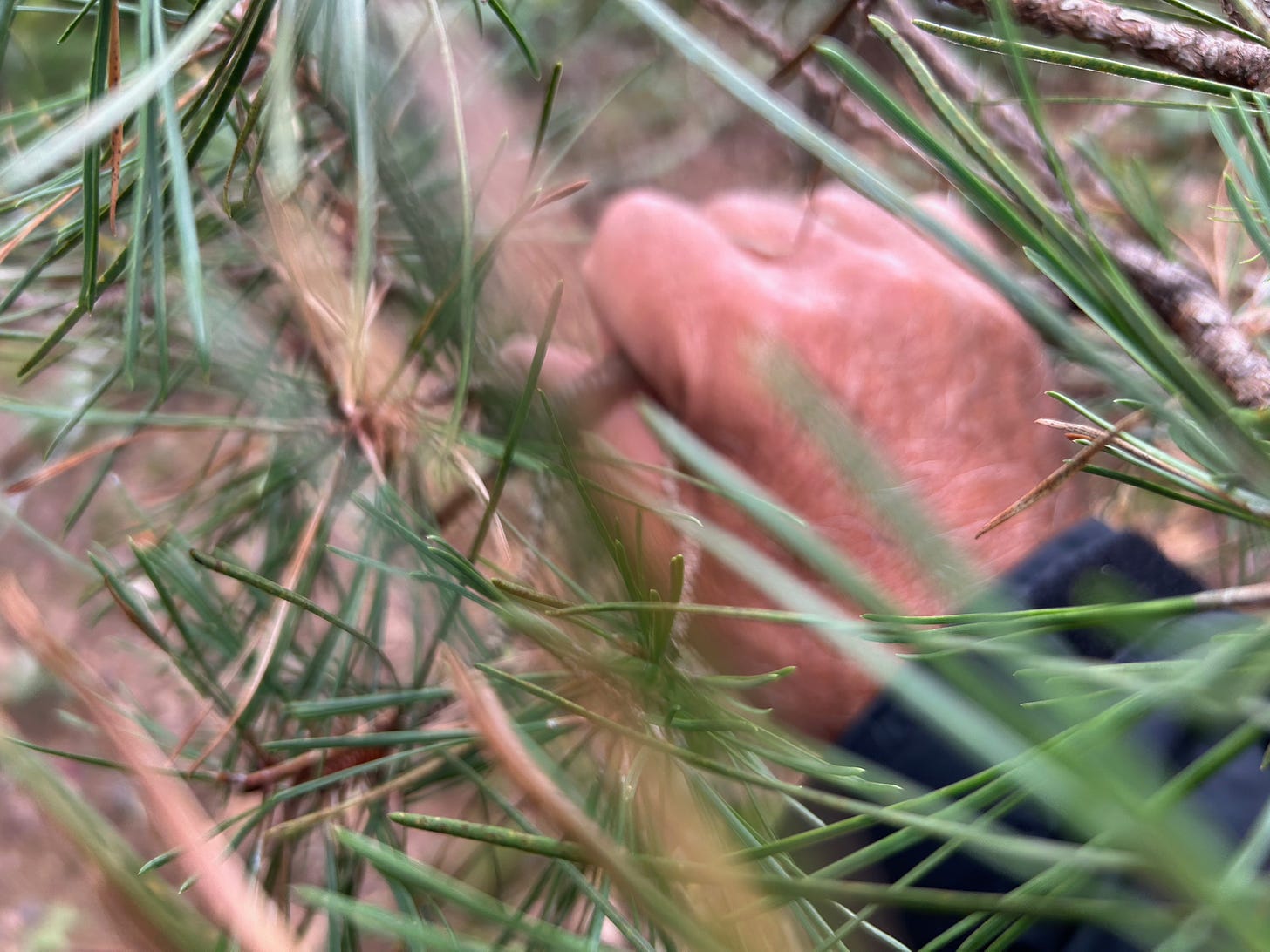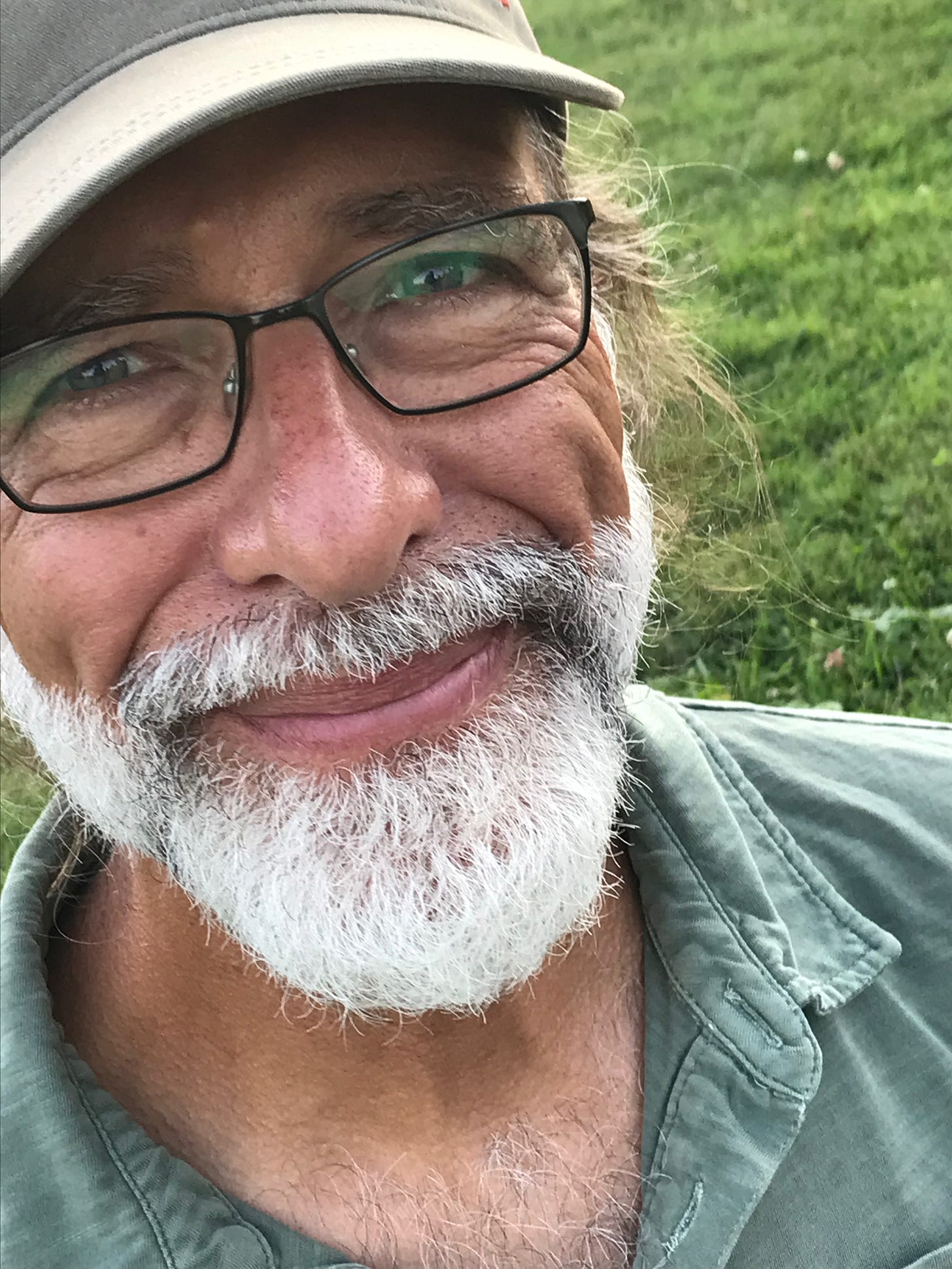Hello. This is Shy Guy Meets the Buddha, and I’m Don Boivin. Thanks for being here. If you like what you are about to read, please consider a small token of appreciation; a tip or paid subscription would be so generous and so helpful. Thank you! 🙏 (“Buy Me a Coffee” is an online tipping platform where you can tip as little as $5 to your favorite hard-working writer 😊)
Hello, my dear readers. Have I told you lately how grateful I am for your presence, your thoughtful and intelligent attention, your patronage and friendship? I feel blessed to have you in my life. 🙏💚
Today’s post is a little different, much more casual than my regular weekly essay. I’ve been fully immersed in an autobiographical piece about becoming a full-time in-person college student at the age of 48, and it is polished and ready to publish, but for personal reasons, I feel the need to wait. This sudden change of plans leaves me with nothing prepared for this week’s post. Fortunately for me, I can always turn to my personal journal for some insights to share. Here are some recent entries. (I couldn’t decide which to include and which to leave out, so I got greedy and just copied everything from 9/23 onward. Please read at your leisure, and in any order. The final two sort of go together.)
9/23/2024
(Note that I have
’s permission to publish this entry. Thanks, Diamond! My plan was to expand this into a separate essay, but here it is in the raw.)This entry is a response to Diamond-Michael Scott’s Substack post, “Is Ignoring Your Life-Calling the Ultimate Self-Betrayal?” In the post, he discusses a book called Callings: Finding and Following an Authentic Life. Diamond is feeling called to work in the healing arts. He’s 61 and expresses the familiar fears of making a big change, trying something new and risky.
My response is ambiguous. Actually, it’s a little bit of a push-back. I feel that putting too much weight on a “life calling” is exactly what leads to Fear Of Missing Out and a host of other fears and anxieties. I think it is the expression “ultimate self-betrayal” that I have trouble with. It wreaks of “better get your life in order quick or it will be too late and you’ll be old and filled with regrets.” I don’t like this kind of pressure and I think it’s a false path.
Yes, I truly believe in doing the inner work to gain the courage and freedom to pursue any direction one feels inclined toward. Sometimes that courage comes very late in life. I myself am in a situation where I could look back at my life and, if the answer to Diamond’s question is yes, ignoring your life-calling is the ultimate self-betrayal, then have to regret the way I lived. I never felt “called” to be a carpenter, and to this day—still doing carpentry for my income—I feel the same. It was and is a good and satisfying skill, but I never felt that it was my life calling. I am 60. Now that I am writing spiritual essays, I feel much closer to my “calling.” (I am going to continue to put that word in quotes because I don’t like its implication: that each person is fated for a certain vocation in their life, one that isn’t clearly revealed to them but, rather, that they must first discover—if they’re lucky and have the means—like a treasure hunt, and then find the courage to follow. Is life a lottery? A cruel carrot-on-a-stick game that some Supreme Being is playing on us?)
It's this sense of dire importance that I’m not comfortable with. Again, the implication is that one choice is going to lead to happiness and the other to misery. What if that is not the case? What if it’s not about choices at all but about what you learn from your experiences in responding to the consequences of all choices, good or bad?
My poor choices were made because of causes beyond my control, beginning with my ancestors’ lives, my parents’ lives, my upbringing, community, my sensitivities and proclivities. To think that I could have made better choices if, if, if....
Naw, I prefer to look at it this way. My poor choices made me who I am today, and I like who I am today. My “wrong” choices gave me piles and piles of subject material for my writing, and also gave me life-lessons to learn from. I know exactly what suffering is. And confusion and desperation and anxiety and loneliness. Because I have experienced those things, I can empathize—with others and with my own pain. Of what use would I be as a writer, as a friend, as a healer, if I didn’t really know suffering, if I had always made the best choice, leading to a rewarding and satisfying and happy life?
But the key point here is my rejection of this idea of a life-calling, and the importance of following it, lest you find your life wasted and unhappy. Tsk, tsk. No, no. It couldn’t be that way. There was a time not so long ago in human history when there were no jobs to feel “called” to.
I don’t mean that one should ignore the idea of finding satisfying work that feels important and fulfilling. I think that’s just a fact, that people desire that. I just mean to take a closer look at that desire; the need, the attachment. To take a much closer look at the self and find out why it feels important. Are there attachments to illusory ideas and concepts that are not as solid as one thinks? Will the fulfillment of that desire to find meaningful work only lead to more desire? Is it part of the need to believe that one is here for a reason, that one is unique, that one is permanent and important? Is it about the fear of death?
If I could not write, or create art or music, or even build with tools; if I couldn’t do but could only be, if I couldn’t manifest but only witness, I think I would be all right. Because I’ve been actively letting go of me.
I suspect it’s the attachment to me that’s behind the desperate need to not betray one’s “life-calling.”
9/24/2024
Let’s get away from the “self” for a moment, during this meditation, and focus on the breathing in and out of the body. The air around the body needs to go into it and out of it. When I don’t identify with the body, I see a larger entity; one that includes both the body and the space around it. This entity is swirling and moving back and forth, in and out, as a whole. It is a single entity. Could we call it spacebody, like spacetime?
— The following was my response to a reply on my latest Substack essay, “The Waves Speak Wisely.”
“K__, I can really relate to what you’re saying. One hopes that when the Ultimate Source is finally realized, it will feel like some cathartic or euphoric experience, one from which you can never go back. But I honestly believe that the experience of truth can vary from personality to personality.
One thing I know, though, is that the understanding can continue to deepen and to be experienced in new ways as one continues to practice mindful awareness. The other day I was walking in the woods. On one side of the path was a pitch-pine sapling and on the other an oak. I held a branch in each hand and asked, “Who are you? What is it about you that knows how to produce your individual leaves in order to collect sun and rain and produce oxygen? What is it in you that knows to root deeply into this very same ground, each of you different but both with that same knowledge?” And me. My body knows so many things that “I” don’t. How to grow fingers and toes, how to digest my food.
And I felt viscerally that the source of all that knowledge, the trees’ knowledge and the human’s knowledge, was one. Now I have that memory to hold onto. Any time I’m feeling uninspired I can close my eyes and envision my two hands holding the two branches, one from each side of the path, and I can imagine “the ultimate” as a current that runs from one, through me, and to the other.
Phew! I think I’ll save this response to my journal. Thanks for inspiring me this morning, K___!”
9/25/2024
E.R wrote in a Substack post, “I am not a Buddhist, I am just me.” I shared the quote to Notes, adding, “My sentiments exactly.” S.P. asked why I agreed with the quote. This was my answer. (Some of my readers may have already read this entry in a Substack Note.)
“That’s a very good question, thank you for asking! 😊
Buddha was also not a Buddhist, he was just who he was.
While it is the Buddhist teachings that have changed my life—mainly the distilled and amalgamated Western mindfulness teachings that Joseph Goldstein likes to call “One Dharma”—and while I meditate every day, and twice monthly with an organized meditation group, read Buddhist and other spiritual literature all the time, and seek to embody the three characteristics of that One Dharma—Wisdom, Compassion, and Mindfulness—I don’t call myself a Buddhist because I don’t think the heart of the teachings would endorse it.
Looking closely at the true nature of things, one learns that there is no one lasting and permanent characteristic to hold onto. We are nothing but change. In order to stay open to that change, I prefer no labels.
I like to use the example of a deep forest in, say Northern Wisconsin or Montana. Does that forest think of itself as “The United States of America”? Does it look across the invisible border to its neighbor and say, “Hello, Canada!”?
The birds reveal the true nature of that forest when they fly from one country to the other, failing to recognize flags, tollbooths, or customs and immigration checkpoints; it is just forest to them.
And I am just me.
Truth is one of my highest values, so I’ve been in the process of understanding everything that is not truth in order to experience reality in all its actuality.
So, basically, if it ends in -ism, I am open to learning about it, but I don’t call myself it.
Hope you don’t mind the long answer! 😆”
9/30/2024
When everything that changes has changed.
(This entry, compared to the above entry of 9/24, shows that I can contradict myself as well as the best; ie; Whitman lol)
—Tonight in my meditation I came to the realization that I have to be able to trust my own way of understanding the true nature of self and existence. And there is something about some of the Dharma literature I’ve been reading that just doesn’t sit comfortably with me (and also with the book I’ve been reading, I Am That, which I guess isn’t technically Dharma, since it’s Hindi, not Buddhist, though the ideas on dualism are very similar). It is that there is a Supreme consciousness that is higher than our individual consciousness. Big You, as Zen teacher Shunryu Suzuki calls it. The one thing that remains changeless.
It's an abstract metaphor, I think, something the spiritual writers call God, the Source, the Ultimate, the Unconditioned, the Supreme Consciousness, the All. That’s fine, and sometimes I feel comforted by thinking about that myself. But it doesn’t ever stay with me as an obvious and permanent truth. I don’t see permanence in anything. Ever.
The only thing I can see clearly and accept as truth is that what we are changes. It changes slowly throughout the 75 or 90 years of this manifestation as a human, then kind of quickly after the organs stop working and the body decomposes, but then slowly again as everything that once made up the body rejoins the earth and atmosphere, and maybe even beyond the atmosphere, and begins to become other things; rivers and trees and air and soil, animals and, yes, other humans.
So that is what I know to be true; that we are not actually destined to die, but rather to become everything else. That’s enough for me. It’s quite miraculous and dumbfounding and humbling to think that all of my ancestors, going back to the beginning of life on earth, surround me and encompass me right here, right now.
—Perhaps the change itself is the Ultimate. The mind can’t grasp it.
Oct 1, 2024
Everything that changes, changes from something, to something.
I think that’s the key point that we miss when we cling, wanting things to stay as they are. We fear death, and the end of things, because we believe things cease to exist, that they are no more, that death is the absolute end and the result is nothingness. But that is wrong. Everything that exists may change, but it doesn’t end. It continues to exist, only in a new form.
Walking on the beach early this morning, I watched a struggling crab slowly stop struggling as it got eaten by a seagull. First I thought, is that all the crab existed for, to become seagull food? How sad. But then I realized, that crab is now a seagull. And that crab is also now the beach. Its shell will disintegrate into tiny grains of sand. When we lie on the beach, we lie amongst millions of crabs. When a seagull flies overhead, it’s a crab remanifested and taken flight.
The key is that we mustn’t be too attached to the thought, “I am this.“ The “I am this“ is as impermanent as everything else. “I am this“ becomes “I am that“ becomes “I am everything.”
Thank you for reading Shy Guy Meets the Buddha: Reflections on Work, Love, and Nature. If you enjoy these mindfulness-themed biographical essays and would like to show your support, please consider becoming a valued patron for only $5 a month.
Alternatively, a one-time donation will help me continue the hard work behind these creative efforts; “Buy me a coffee” here or by clicking the button below. And don’t forget to like and share; Please take a few moments to show you care. Thank you! 💚








I’m commenting fresh as I’ve just read the first entry, so there might be more comments from me, if I feel called to write more. Here, I’d like to touch on this very notion of a “calling”. Your take on it was captivating to me because in my own writing, I sometimes say that there’s a calling within us which asks of us big things—openness of the heart, courage to dismantle our “self” bit by bit, and to know the truth. In my understanding, the calling we all carry is the calling to become free from ignorance and suffering. And following this calling is a path of fulfilling our deepest potential. It is within the means of nearly everyone (as the access to the internet spreads for better or worse), and it doesn’t require a specific job or external circumstances (with some exceptions of course). I wonder, what is your take on such a perspective on the calling? I’d be very grateful to hear your thoughts on this subject!
This belief that I can only be happy and fulfilled by making a living doing what I am Called” to do has really only led to frustration. I’ve been much happier, and much less stress since I gave it up.
Nice essay/collection of them!